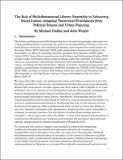The Role of Multidimensional Library Neutrality in Advancing Social Justice: Adapting Theoretical Foundations from Political Science and Urban Planning
Metadata
Afficher la notice complèteAuthor
Dudley, Michael
Wright, John
Date
2022Citation
Dudley, Michael and John Wright. "The Role of Multidimensional Library Neutrality in Advancing Social Justice: Adapting Theoretical Foundations from Political Science and Urban Planning." The Journal of Intellectual Freedom and Privacy 7 no. 3, (Fall 2022).
Abstract
There is an ongoing, polarizing debate in the library profession and scholarship regarding the perceived incompatibility between library neutrality (embedded in the profession through the American Library Association’s Library Bill of Rights), and social justice goals. This article asserts that the growing antipathy on the part of some library practitioners and scholars towards neutrality and intellectual freedom is owed at least in part to the profession and scholarship having never articulated an adequate definition of what is meant by neutrality. As a result, the profession lacks a theoretical framework situating the library and library staff as political actors within a multicultural and largely urban society. We argue that such a framework may be drawn from the literatures of political science and urban planning. By positioning libraries and library workers within the context of liberal-democratic institutions – as is the case for urban planners in their theoretical literature – LIS theory can find more durable foundations for its core values. Stressing planning’s commitments to the participation of multiple publics, to dialogue, mediation and to consensus-building through liberal institutions, we develop a multidimensional understanding of neutrality premised on values, stakeholders, processes and goals which we then apply to these planning modes. Finally, we propose a model of “Communicative Librarianship” as best exemplifying these four dimensions of neutrality and their attendant democratic commitments.

